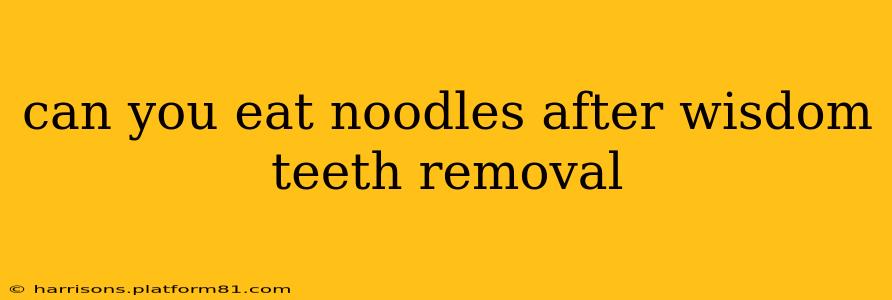Can You Eat Noodles After Wisdom Teeth Removal? A Comprehensive Guide
The post-wisdom teeth removal diet is a crucial part of the healing process. Soft foods are key, and noodles often come up as a potential option. But can you eat noodles after wisdom teeth removal, and if so, what kind? Let's dive into the details.
The answer isn't a simple yes or no. It depends on several factors, primarily the type of noodle and your individual healing progress. Immediately after surgery, your mouth will be quite tender, and even soft foods might be challenging. As you heal, your tolerance for different textures will gradually increase.
What Kind of Noodles Are Okay After Wisdom Teeth Removal?
Suitable Noodle Options:
-
Soft, well-cooked noodles: Think broth-based noodle soups with very soft noodles, such as ramen (ensure the noodles are thoroughly cooked and easily mashed), udon (again, very well-cooked), or egg noodles. The key is that they should offer minimal resistance when you chew. Avoid noodles that are firm or chewy.
-
Pureed noodles: If you're in the initial, most painful stages of recovery, you might need to puree your noodles. This ensures maximum ease of consumption. You can blend cooked noodles with broth until they reach a smooth, easily swallowable consistency.
Noodles to Avoid:
-
Noodles requiring significant chewing: Avoid any noodles that are thick, dense, or require significant chewing. This includes most uncooked or undercooked noodles, thick spaghetti, and any noodles with a firm or chewy texture. These could irritate the surgical site and potentially disrupt blood clots, increasing the risk of dry socket.
-
Noodles with crunchy or hard toppings: Stay away from noodles with added crunchy toppings like fried onions, crispy garlic, or hard vegetables. These could easily get lodged in the extraction sites and cause irritation or infection.
How Soon Can I Eat Noodles After Wisdom Teeth Removal?
This depends on your individual healing and the surgeon's instructions. Generally, it's best to stick to a completely liquid diet for the first 24-48 hours post-surgery. After this period, you can gradually introduce softer foods, like well-cooked noodles, as tolerated. Always listen to your body and stop eating if you experience any pain or discomfort.
What if I have a Dry Socket?
A dry socket is a painful complication that can occur after a tooth extraction. It's characterized by exposed bone in the extraction site. If you experience severe pain, a bad taste, or a visible empty socket, contact your dentist or oral surgeon immediately. You may need special care and possibly medication to address the dry socket. Avoid using a straw and avoid sucking motions that may dislodge any blood clots, as this would greatly increase the chance of experiencing a dry socket.
What are other soft food options after wisdom teeth removal?
Besides noodles, other suitable options include:
-
Smoothies: Blend fruits, vegetables, and yogurt for a nutrient-rich and easy-to-consume meal.
-
Applesauce: A classic soft food option that's easy on the gums.
-
Yogurt: Provides protein and probiotics for healing.
-
Mashed potatoes: A staple soft food.
-
Scrambled eggs: Ensure they're very soft and well-cooked.
Remember, patience is key. Your recovery will take time. Focus on nourishing yourself with soft, easily digestible foods, and listen to your body’s signals. If you have any concerns, always consult your dentist or oral surgeon. They can give you personalized advice based on your specific situation and healing progress.
